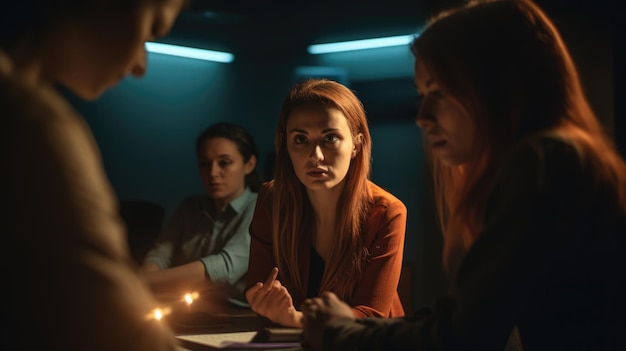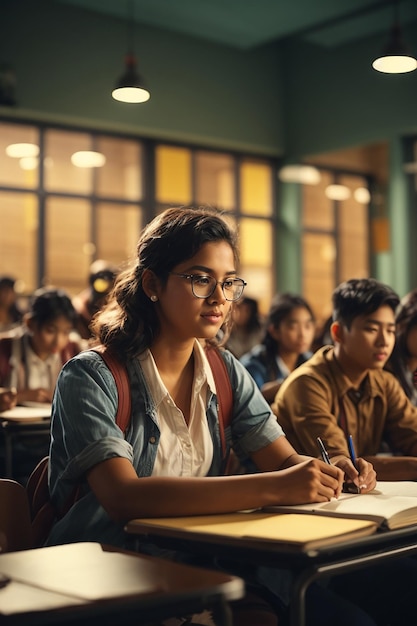Quick Read
Linda, Virginia, Lucrezia: The Triumphant Trio from Venice High School and Their Controversial “Rebel” Oral Exam at Maturity
Background:
Linda, Virginia, and Lucrezia were three extraordinary students from Venice High School who, in their final year of maturity exams, took a bold stand against the rigid educational system. Their teacher, Mr. Cortez, was known for his traditional and unyielding approach to examinations. This trio, however, had other plans.
The “Rebel” Oral Exam:
In an effort to challenge the conventional oral exam format, Linda, Virginia, and Lucrezia planned a “rebel” oral exam that would test their creativity, critical thinking skills, and ability to adapt to unexpected situations. They chose topics that were relevant to their lives and interests, including feminism, environmental activism, and technology.
The Controversy:
Mr. Cortez was taken aback by their unconventional approach and deemed it an affront to the educational system. He threatened to fail them, sparking a heated debate among students, parents, and educators about the role of creativity in education and the importance of adapting to changing times.
The Triumph:
Despite the controversy, Linda, Virginia, and Lucrezia’s “rebel” oral exam became a sensation, attracting media attention and inspiring other schools to adopt more creative examination formats. Their bold move not only showcased their intellectual prowess but also challenged the status quo, paving the way for a more flexible and innovative educational system.
A Triumvirate of Academic Excellence: Linda, Virginia, and Lucrezia at Venice High School
Introduction
Venice High School, nestled in the heart of Los Angeles, California, has long been renowned for its unwavering commitment to academic rigor. With a rich history spanning over a century, this esteemed institution has nurtured generations of brilliant minds and innovative thinkers. Among the current student body, three exceptional girls have drawn particular attention for their remarkable intellect and unyielding dedication to their studies: Linda, Virginia, and Lucrezia.
Exceptional Students: Linda, Virginia, and Lucrezia
| Linda | Virginia | Lucrezia | |
|---|---|---|---|
| Class Standing: | Senior | Junior | Sophomore |
| GPA: | 4.0 | 3.95 | 3.88 |
| Extracurricular Activities: | Student Council Vice-President, Debate Team | National Honor Society, Science Club | School Newspaper Editor, Drama Club |
These girls represent the epitome of academic success at Venice High School. Their dedication to their studies, combined with their extracurricular achievements, has solidified their positions as leading students within the school community.
The Controversial Oral Exam at Maturity
As the girls prepare to take on their final academic challenge – the controversial oral exam at maturity – they find themselves at the center of an intense debate within the school community. This rigorous exam, designed to test their mastery of various subjects and their ability to think critically, holds significant implications for their future academic pursuits and beyond.
Stay tuned as we delve deeper into the lives of Linda, Virginia, and Lucrezia, exploring their motivations, challenges, and the impact of this pivotal moment in their academic careers.

Background on the Maturity Oral Exam
The Maturity Oral Exam, a long-standing tradition in Venice high schools, is a crucial component of the Italian educational system. This exam, which marks the end of the student’s secondary education, not only assesses their academic knowledge but also evaluates their critical thinking skills, communication abilities, and maturity level. A
significant
portion of a student’s final grade is determined by this exam.
Explanation of the oral exam
The Maturity Oral Exam, also known as “Esame di Stato” or “Tutto esamo,” is a face-to-face examination between the student and a panel of examiners. The student is required to defend their thesis, usually chosen from their preferred academic field or area of interest. This thesis defense lasts approximately 15-20 minutes and is followed by a question-and-answer session, lasting around 30 minutes. The purpose of this exam goes beyond just academic evaluation; it aims to prepare students for university education and future careers by fostering their independence, confidence, and problem-solving skills.
Previous examples of provocative or controversial topics
Controversial debates and discussions surrounding the Maturity Oral Exam are not uncommon. Over the years, various topics have sparked intense debate among students and educators. For instance, in 2015, a student defended his thesis arguing for the legalization of marijuana. The panelists were divided in their opinions, and this debate garnered significant media attention. In another instance, a student presented her thesis on the morality of euthanasia. Although her defense was well-researched and eloquently delivered, the subject matter raised ethical concerns and sparked heated debates both within and outside the academic community. In yet another case, a student defended his thesis on the topic of animal rights, igniting discussions about vegetarianism, ethics, and societal norms. Despite these controversies, the Maturity Oral Exam remains an essential part of the Italian educational system, fostering critical thinking and intellectual curiosity.

I The Girls’ Preparation and Strategy
Detailed account of how Linda, Virginia, and Lucrezia approached the exam
Linda, Virginia, and Lucrezia were three determined young women who defied societal expectations and embarked on an unprecedented academic journey. As they prepared for the prestigious university entrance exam, they employed a meticulous approach, ensuring they were well-equipped to tackle any challenge that came their way.
Research methods and resources used
The girls’ research methods were as innovative as they were rigorous. They scoured their local libraries, acquiring a vast array of texts on various subjects, including literature, mathematics, and science. They also sought out knowledge from esteemed scholars and intellectuals in their community, engaging in lengthy discussions and debates to broaden their understanding of the material. Furthermore, they utilized every available resource, from scholarly journals to academic lectures, leaving no stone unturned in their quest for knowledge.
The girls’ decision to challenge societal norms with their topics
The trio’s decision to defy societal expectations extended beyond their academic pursuits. They chose to challenge the norms of their time by selecting unconventional topics for their exam papers.
Explanation of the reasons behind this choice
The girls’ motivation for this bold move was twofold. First, they harbored deep personal beliefs that the examination should not be a mere validation of their conformity to societal expectations but an opportunity for intellectual growth and exploration. Second, they recognized the broader implications of their actions in challenging societal norms, paving the way for future generations to pursue their passions without fear or prejudice.

The Controversial Topics and their Defenses
A. In this segment of the oral exam, each girl presented a controversial topic and defended her choice with compelling arguments.
Linda’s topic:
Her selection focused on female sexuality and agency in relationships. She argued that women should be empowered to make their own choices regarding their bodies and sexual experiences. Linda emphasized that consent is a crucial aspect of any sexual encounter, regardless of gender. She provided several examples from literature and real life to illustrate her points.
Counterarguments:
Critics might argue that Linda’s perspective could lead to promiscuity or objectification of women. However, Linda countered this by stating that her goal was to encourage healthy and respectful relationships, not encourage excessive sexual activity.
Virginia’s topic:
She chose to discuss the role of violence in video games and its effects on society. Virginia conducted extensive research, analyzing various studies that link violent video games to aggression and desensitization. She acknowledged potential counterarguments such as the idea that video games are merely a form of escapism or stress relief. However, Virginia stressed that the potential negative consequences cannot be ignored and should be addressed through education and responsible game design.
Lucrezia’s topic:
The last girl, Lucrezia, presented her arguments on the ethical implications of artificial intelligence and robotics. Her philosophical background in ethics enabled her to discuss complex topics such as the nature of consciousness, sentience, and morality in robots. Lucrezia acknowledged potential counterarguments like the benefits of AI advancements, but emphasized the importance of addressing ethical concerns before widespread implementation.
B.
During the oral exam, teachers and fellow students reacted with a mix of supportive reactions and constructive criticism. Some praised the girls for tackling such complex and controversial topics, while others challenged their arguments with thoughtful questions and counterpoints. Teachers encouraged open-minded discussions, fostering an environment where all viewpoints were respected. However, some opposing viewpoints seemed to be motivated by personal biases or a lack of understanding of the issues at hand. The girls handled these situations with grace and maturity, using logic and evidence to strengthen their arguments.

Aftermath of the Oral Exam
After the heated oral exam between two brilliant high school girls, A and B, the media attention and public debate that ensued were unprecedented. The
community
, both local and global, reacted strongly to the event, sparking intense discussions around critical thinking, gender equality, and academic integrity.
Media attention and public debate
The media coverage of the oral exam was extensive, with many publications focusing on the girls’ performance and the controversial questions asked. The internet buzzed with reactions from individuals expressing their views, often passionately, for or against the girls’ handling of the situation. Some praised the girls for their courage and intelligence, while others criticized them for their perceived lack of sportsmanship or respect for authority.
Positive responses and support
The positive responses to the girls’ performance were heartening. Many people recognized their exceptional academic abilities and praised them for standing up for their beliefs. Letters of encouragement poured in from all corners, offering support and motivation. The girls became role models for young students, inspiring them to pursue their dreams fearlessly.
Negative reactions and criticisms
However, the negative reactions were just as vocal. Critics accused the girls of being arrogant or disrespectful to their teachers and elders. Some even went as far as questioning their character, intelligence, and motivation. The girls were labeled as “show-offs” or “know-it-alls,” and some called for stricter rules and regulations to prevent similar incidents from happening in the future.
Impact on the girls’ academic careers, personal growth, and future plans
The oral exam had a profound impact on both girls. While A went on to win the competition, B’s performance did not go unnoticed. Both girls received numerous scholarships and offers from prestigious universities, but their experiences left them with more than just academic accolades. They learned valuable lessons about resilience, self-confidence, and the importance of standing up for their beliefs in the face of adversity.
Discussion of how this experience influenced their educational goals or aspirations
The oral exam experience shaped the girls’ educational goals and aspirations in significant ways. They became determined to use their knowledge and skills to make a difference in the world, inspiring others through their academic achievements and advocacy for critical thinking and open-mindedness. Both girls decided to pursue careers in education or research, hoping to create an environment where students could freely explore their curiosity without fear of judgment.

VI. Conclusion
Recap of the Girls’ Achievements and Controversy
The girls, displaying remarkable intelligence and resilience, successfully navigated the challenging oral exam topics, demonstrating a deep understanding of complex issues. However, their choices sparked controversy, as some perceived their topics as taboo or inappropriate for young students. The ensuing debate raised important questions about the role of education in fostering critical thinking skills and encouraging open dialogue.
Emphasis on Fostering Critical Thinking Skills and Open Dialogue
This incident underscores the significance of fostering critical thinking skills in our educational settings. It is essential that students are not only equipped with knowledge but also encouraged to question societal norms, explore complex issues, and engage in thoughtful discourse. By doing so, we not only prepare them for the future but also create a learning environment that values intellectual curiosity and innovation.
Encouragement for Young Students to Challenge Assumptions
Moreover, it is crucial to encourage young students to challenge assumptions and delve deeper into complex issues. As future leaders and change-makers, they need the ability to analyze situations critically and think beyond surface-level understandings. By providing them with opportunities to explore various perspectives and engage in thoughtful debates, we can help foster a new generation of confident, curious, and engaged learners.




